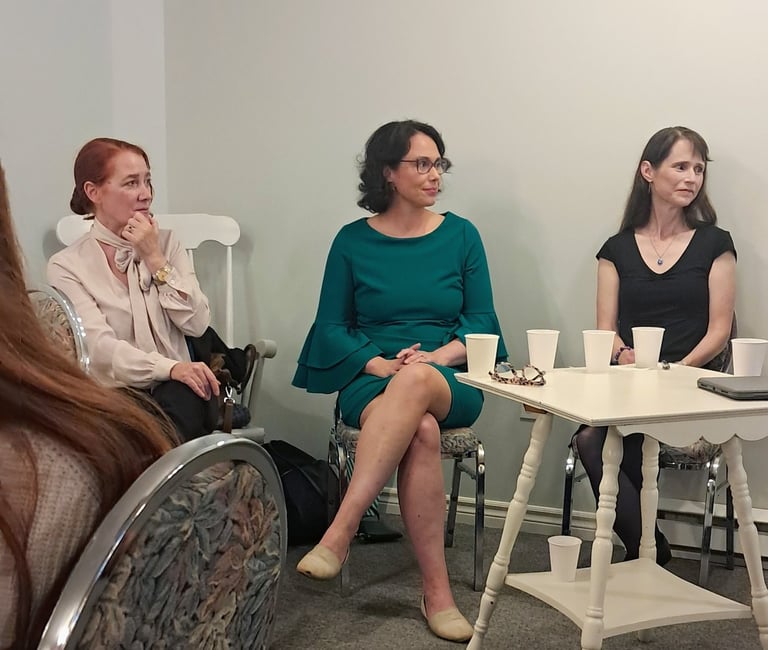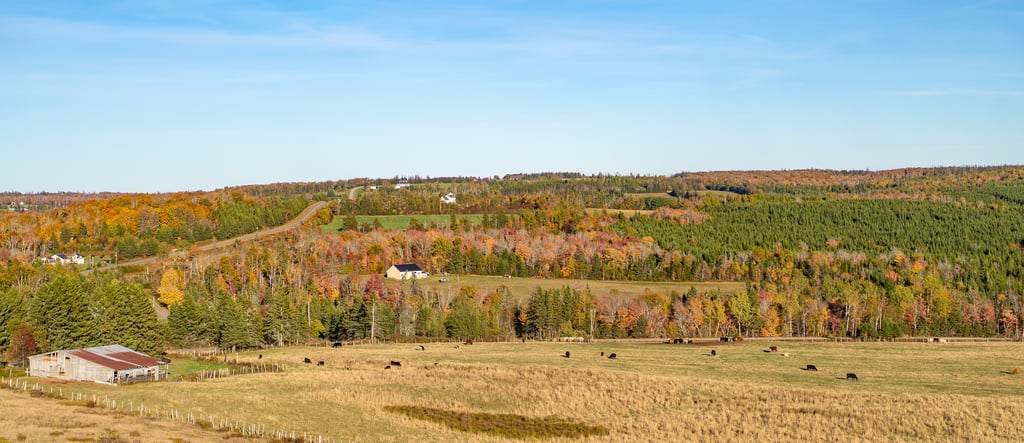The Values of Literature - Why We Need Them and Why AI Might Not
Exploring the Timeless Appeal of Female Protagonists at the Cavendish Literary Festival, then digging deeper why we enjoy literature, especially in context of the rapid growth of AI...
WRITINGSELF-PUBLISHING


Introduction to the Cavendish Literary Festival
I recently attended the Cavendish Literary Festival, which celebrates the rich literary heritage of Cavendish, PEI, and beyond (Atlantic Canada). This 3-day festival included many sessions, for readers, writers, and events with authors. One of the standout sessions of the festival (for me, anyway) was "Novel Women," where three panels (Laura Robinson, Kate Scarth and Sarah Emsley) delved into the enduring works of L.M. Montgomery and Jane Austen. Their discussions provided fascinating insights into what makes these writers’ stories resonate, particularly among women. The room was filled with women of different ages and cultures. Tea and coffee, biscuits & cookies were provided, and throughout the session, the atmosphere was relaxed and warm; there was a sense of community.
Behind the Lasting Popularity
During the "Novel Women" session, the panelists examined the strong heroines portrayed in Montgomery's and Austen's stories. These characters, shaped by their environments and the challenges they face, embody resilience and a strong sense of self, to be more precise, feminine self. Anne, Emily, Valancy, Emma, Elizabeth, Elinor... They possessed what many women have yearned for over the centuries, but were not circumstantially and socially allowed, and even now, when women's voices and status have improved immensely. They said how their works have gained acceptance as literature and are being considered worthy of research in recent years shows the recognition of the significance of women's perspectives and voices.
Another point raised that contributed the enduring popularity (particularly of Anne) was the theme of acceptance and sense of belonging (home). With this, I totally agree. I remember reading how she ended up winning people's hearts (not sure how intentional she was), and how I admired such qualities. This continues to be the universal quest of us human beings— even today, if not more than ever.
They also talked about the importance of "the Spirit of Place". This is again particularly true in Anne of Green Gables: Avonlea (Cavendish) for Anne. There was something about how Montgomery described Avonlea and PEI. I'm sure that originally came from her own affection and appreciation for the place she grew up, and it was so well imparted to the readers. This is the strong foundation of Literary Tourism as we have now. Her descriptions of the place planted such desires in readers to see the place themselves.
My BA thesis was on Anne’s popularity in Japan (particularly among women). My focus then was on the role of the first translator and some effect of tourism marketing. It seemed such a complex issue with so many factors involved that I couldn’t tackle them all. But now, as I listened to the talk, I felt I could write more, being able to articulate other factors that I had vaguely sensed back then but couldn’t write with confidence. Those include the themes of strong yet feminine characters, humanity’s quest for acceptance and belonging, and the Spirit of Place.
Humour and Humanity in Austen’s Works
The conversation also highlighted Jane Austen’s unique brand of humour. Austen skillfully incorporates gentle humour throughout her stories, which can easily be overlooked if one doesn’t pay close attention. This adds layers to her characters and their interactions, making them relatable. Montgomery also sprinkled her own humour among her stories. Montgomery is said to have read Austen’s stories, so it is no surprise how she incorporated humour could have been influenced by Austen’s writings.
During the discussion, the moderator read excerpts from both of their novels (that the panels had picked in advance), and got the audience to guess whose novel and which one it was. It was a fun exercise, and sometimes it was hard to tell.
During the discussion, one of the panels said their stories depicted what it means to be human, which totally struck me as true. They reveal the complexities of human thoughts and emotions, which, combined with those of others, often lead to the intricacies of human relationships. Of course, this could be said for other literature as well.
Then, my mind shifted to the recent development of AI, and I thought... “Would AI enjoy reading novels? Do they need literature? or other forms of arts for that matter—- paintings, music, play...?” I think we all know the answer: no... I don’t think so. As powerful, capable, and intelligent AIs are, they don’t have hearts that these arts can touch and move. If that is the case, then, it could be that artists (writers, poets, musicians, painters, actors etc) are one of the last careers that remain after all the advancement of AI and taking over many jobs.
The Values and Purpose of Literature and its Studies
I left the “Novel Women” session with renewed appreciation for these authors and the inspiring dialogues they shared. In fact, it brought me back to my undergraduate and graduate school days, when I wrestled with women’s writings, including Montgomery’s, exploring the significance of them. My BA was in Japanese Intercultural Studies, which comparative literature and cultural studies were part of. It was fascinating and I truly enjoyed my learning, but years later, when I needed to look for a job, I realized my degrees were not very practical (not connecting to specific skills or knowledge for certain jobs). While it was discouraging at the time, I felt like this session has redeemed some of those regrets I may have had over the years. The purpose and value of studying literature lie in other dimensions—such as understanding the human experience, preserving cultural memory. It pursues what sustains, refines, and even expands our humanity. Isn’t that most appropriate study in a way in this age of AI explosion?
The Cavendish Literary Festival was not just an event; it was a celebration of writing and storytelling, inviting readers to explore what lies beneath the surface of beautifully crafted narratives.


The Book Doula
Delivering Self-Publishing Services
1-902-206-5040
© 2026 All rights reserved.
